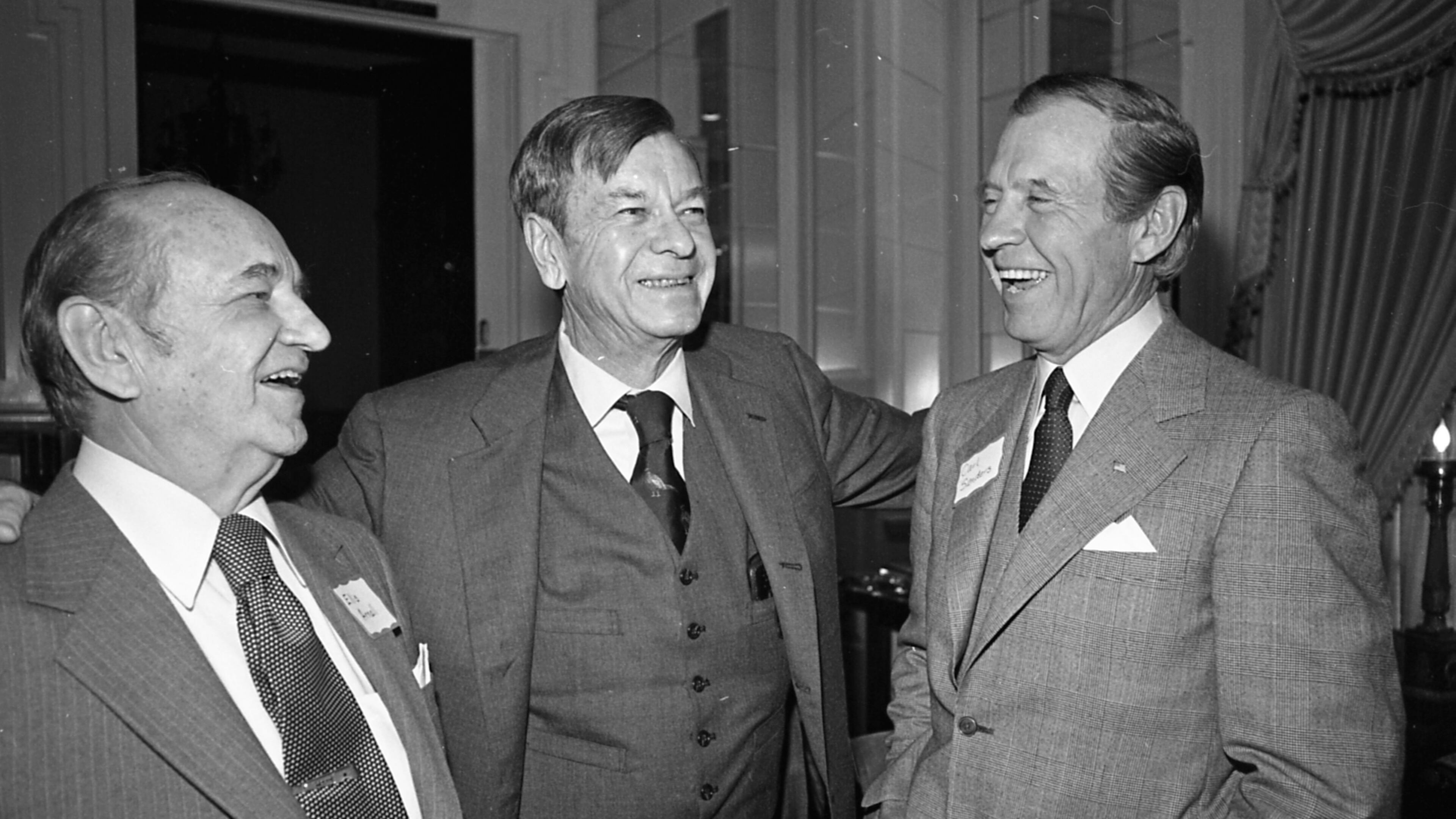Herman Talmadge 1913-2002: Way back when, he was us

In the midst of his troubles two decades ago, Herman Talmadge paused to pay his final respects to one of his most famous adversaries, Gov. M.E. Thompson, "a man who had faded from the limelight so many years earlier that it seemed as if I knew him in another life."
He got to the funeral home in Valdosta early in the afternoon, hoping to get a seat before the crowd arrived, Talmadge writes in his memoirs. "But the crowd never came. There were only two hundred people at the funeral and only about a dozen at the graveside. [Former Gov.] Marvin Griffin and I were the only two political figures who had bothered to show up.
"I'm convinced that Gray's 'Elegy in a Country Courtyard' was right: 'The paths of glory lead but to the grave.' It's a lesson those of us in public life would do well to remember."
That graveyard epiphany of ephemeral glory was, indeed, the fate and fortune of the most dominant political dynasty Georgia has produced.
When his death was reported Thursday during drive time, the announcer reminded us that "Talmadge's father was also governor way back when."
The Talmadges of Georgia. Way back when. What an extraordinary journey this has been for the Talmadges and Georgia.
The news of his obituary is that he was among that generation of Southern politicians --- the Longs of Louisiana, Strom Thurmond in South Carolina, John Stennis in Mississippi --- "whose careers spanned the era between defiant segregation and Sun Belt boom." But the Talmadge legacy was much, much more than that transformation.
He had lived past his time. While there will be more than a few hundred people to pay homage, most of the Georgians who felt passionately about the Talmadges are gone. Read the obituaries in local newspapers around Georgia and you see even today the passion Georgians felt. Old men whose first names reflect their parent's political passion --- Talmadge Jones, Talmadge Smith --- are dying natural old-age deaths.
RELATED: When Georgia had 3 governors (Talmadge was one) and dead people voted
Even by the fall of 1980, a month after Herman Talmadge reflected at the graveside of his political adversary, the man and the Georgia his dynasty owned had grown distant.
"But as Georgia prospered . . . millions of people from elsewhere in the country moved in. They knew only the new Georgia, not the old. And they had no idea how we had gotten from the old to the new. One such individual was a typewriter salesman from Indiana . . ." Mack Mattingly. The implied sneer was evidence of the once-superb political instinct dulled by a bitter divorce, alcoholism, a Senate investigation and what he considered a "newspaper vendetta."

His dismissal of the new Georgians who packed Metro Atlanta's north side --- he didn't know them; they knew only the last caricature of him --- brought down the House of Talmadge. When the northern suburbs finished reporting, the dynasty had ended. The typewriter salesman from Indiana won by 25,000 votes.
Way back when, for at least half a century, the Talmadges represented hope for millions of dirt-poor Georgians. Cotton mills, sharecropping and moonshining often were the options of rural Georgians. Education was hand-me-down books in one-room schoolhouses with underpaid spinsters presiding over malnourished children needed at home to bring in the crop. Those were the whites. For blacks, it was worse.
In the context of the times, the young back-from-the-war Herman was a progressive governor whose administration laid the foundation for the prosperity Georgians now take for granted.
As governor between 1948 and 1954, using a creative financing mechanism similar to Gov. Roy Barnes' current transportation funding plan, more than 1,000 schools were built and 1,000 one-room schools were closed. Talmadge established the Highway Board, ostensibly to bring order and reduce the politics of roads, and instituted competitive bidding, hired professional engineers and gave them Merit System protecton. By the time he left office, Georgia had paved or planned for 12,800 miles of roads.
In the U.S. Senate, he became a powerhouse in the Southern tradition: Stay there, work hard, gain power, and transfer Yankee wealth south.
Southerners of the working class, until recent times, always have felt slightly inferior. Our schools, our jobs, our farms, our economic opportunities were always inadequate. Our accents wherever we went betrayed us, revealing our disadvantages and, we suspected, our inferiority. The Hollywood Tobacco Road stereotype confirmed it.
But then came Watergate and U.S. Sen. Herman Talmadge and Committee Chairman Sam Ervin.
There for all the world to see was lawyerly brilliance in Southern voice, intellectually quick, astute, incisive, marvelously Southern.
Before Jimmy Carter, there was Herman Talmadge. No doubt in my mind, Talmadge and Ervin made the Carter presidency possible.
Most Georgians never knew Talmadge. He outlived himself. But to those who have come from the swamps and hills and piney woods of Georgia, Talmadge was us. Whatever his successes, faults or shortcomings, he was us.
RELATED

